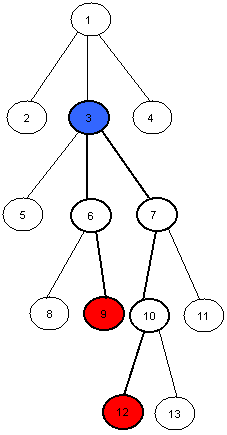LCA - Lowest Common Ancestor
A tree is an undirected graph in which any two vertices are connected by exactly one simple path. In other words, any connected graph without cycles is a tree. - Wikipedia
The lowest common ancestor (LCA) is a concept in graph theory and computer science. Let T be a rooted tree with N nodes. The lowest common ancestor is defined between two nodes v and w as the lowest node in T that has both v and w as descendants (where we allow a node to be a descendant of itself). - Wikipedia
Your task in this problem is to find the LCA of any two given nodes v and w in a given tree T.

For example the LCA of nodes 9 and 12 in this tree is the node number 3.
Input
The first line of input will be the number of test cases. Each test case will start with a number N the number of nodes in the tree, 1 ≤ N ≤ 1,000. Nodes are numbered from 1 to N. The next N lines each one will start with a number M the number of child nodes of the Nth node, 0 ≤ M ≤ 999 followed by M numbers the child nodes of the Nth node. The next line will be a number Q the number of queries you have to answer for the given tree T, 1 ≤ Q ≤ 1000. The next Q lines each one will have two number v and w in which you have to find the LCA of v and w in T, 1 ≤ v, w ≤ 1,000.
Input will guarantee that there is only one root and no cycles.
Output
For each test case print Q + 1 lines, The first line will have “Case C:” without quotes where C is the case number starting with 1. The next Q lines should be the LCA of the given v and w respectively.
Example
Input: 1 7 3 2 3 4 0 3 5 6 7 0 0 0 0 2 5 7 2 7 Output: Case 1: 3 1
hide comments
|
|
Ouditchya Sinha:
2015-01-19 05:17:43
Finally AC... :) Last edit: 2013-10-20 12:48:07 |
|
|
Akash:
2015-01-19 05:17:43
@$!:D I did it the same way u did..my solution is accepted..the only problem i found out is that u have printed "Case t" which always gives number of test cases and not the case number..and u have printed it before taking u and v input..try submitting it after correcting this error..and try compiling it with 4.0.0.8 bcos sometimes 4.3.2 gives compilation error or TLE but it compiles with another compiler Last edit: 2013-06-07 04:37:04 |
|
|
$!:D:
2015-01-19 05:17:43
getting tle plzz help in testcase 0 only!!
|
|
|
raunakrocks:
2015-01-19 05:17:43
AC!!...nyce problem Last edit: 2013-06-08 21:45:39 |
|
|
Haijun Deng:
2015-01-19 05:17:43
Please consider the following cases for WAs:
|
|
|
(Tjandra Satria Gunawan)(曾毅昆):
2015-01-19 05:17:43
@Noszály Csaba: Thanks for the info :-) |
|
|
Noszály Csaba:
2015-01-19 05:17:43
@Tjandra: O(N) precomp + O(log(N)) per query? There are O(1) per query methods too. |
|
|
(Tjandra Satria Gunawan)(曾毅昆):
2015-01-19 05:17:43
my bruteforce O(k*Q*N) without any precomputation is accepted with fast I/O and bitwise optimization ;-) still curious for better complexity... |
|
|
Hussain Kara Fallah:
2015-01-19 05:17:43
Weak testcases , wrong solutions takes AC !! |
| Added by: | hossamyosef |
| Date: | 2013-05-13 |
| Time limit: | 0.600s-1.113s |
| Source limit: | 50000B |
| Memory limit: | 1536MB |
| Cluster: | Cube (Intel G860) |
| Languages: | All |
| Resource: | FCIS/ASU Local Contest 2013 |

 RSS
RSS